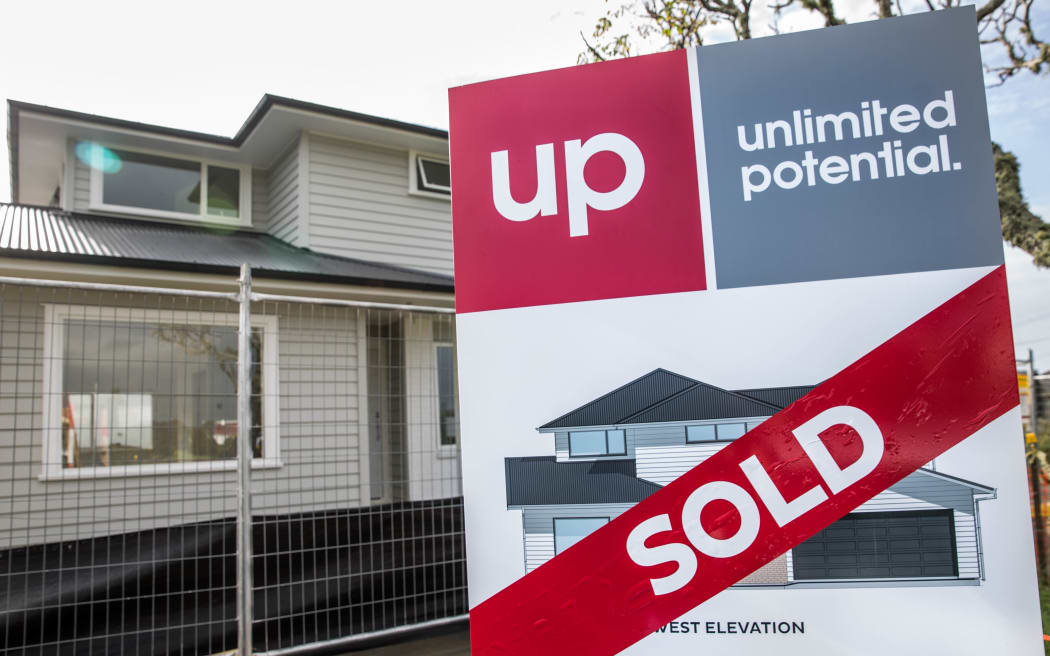The Reserve Bank's restrictions on home loans kick in from today but those in the industry don't believe it will do much to cool the market.

File photo. Photo: RNZ / Cole Eastham-Farrelly
Loan-to-value ratios (LVR) were temporarily lifted in the wake of Covid-19, but a runaway housing market has forced the Reserve Bank to reintroduce them.
Meanwhile, some buyers have been rushing to get their mortgage applications in, to beat the changes.
Demand for mortgages has been through the roof since the end of lockdown last year.
The chief executive of NZ Home Loans, Aaron Skilton, said their 75 businesses across the country have been inundated, with record levels of activity.
"That means we have settled over $1 billion in home loans in the 6 months to December - a record for us."
Investor activity has roughly doubled over the year and first-home buyer demand is up 30 percent, he said.
That has led to delays in processing applications, and demand isn't slowing down.
"Since the start of the New Year, activity levels have increased again. So we are definitely seeing a dramatic increase, this side of Christmas."
CoreLogic's January figures show 30 percent of lending went to investors - the single highest month for that group in 15 years.
But from today, investors will need to front up with a 30 percent deposit and first home buyers a 20 percent deposit to get a loan.
That will move to 40 percent for investors in two months' time.
Banks also have limited scope to lend to borrowers with lower deposits - 1 in 5 first home buyers, and 1 in 20 investors.
Since the Reserve Bank began talking about re-instating lending restrictions, banks have already been voluntarily imposing them.
Senior property economist at CoreLogic, Kelvin Davidson, said the 30 percent restriction is unlikely to do much, but 40 percent should start to have an impact.
"We have seen 40 percent work in the past, so we have every reason to believe that will happen again. But we have had a few comments here or there that if this doesn't work from a financial stability point of view, there is an option to go to 50 percent.
"We've never had that before, but it couldn't be ruled out."
Davidson said it could be six months to a year before demand and prices cool.
Bruce Patten, a director for Loan Market - a mortgage broker giant that covers a third of Auckland's requests, is even more pessimistic than CoreLogic and doesn't believe the restrictions will make much difference, especially for investors.
"If they had a house worth $1 million, it will now be worth $1.2 million, and so they may already have that 40 percent deposit in the equity in their existing home. It's only going to impact on anyone who has bought more recently, perhaps in the last 12 months, that wants to go on to buy something else."
Patten hasn't seen a huge rush in the lead-up to the changes, which he puts down to banks voluntarily switching to the restrictions earlier.
He said even if investors are slightly put off in the coming months, first home buyers will not need to worry.
Banks are happy to lend to those with lower deposits, as long as it's the home they will live in, he said.
"They're really looking at what an individual's ability is, what their profession is, how stable their employment is, in order to make a decision about whether to lend to them."
Skilton agreed that those with property are in very strong positions to invest.
But he was more optimistic the rapid levels of increase will level off, spurred on by the LVR changes.
Last week, Finance Minister Grant Robertson decreed the Reserve Bank will now have to take house prices into account when making its decisions.
The Bank says it was on side with the changes.
The government is set to announce further measures to cool the housing market in mid-March.







